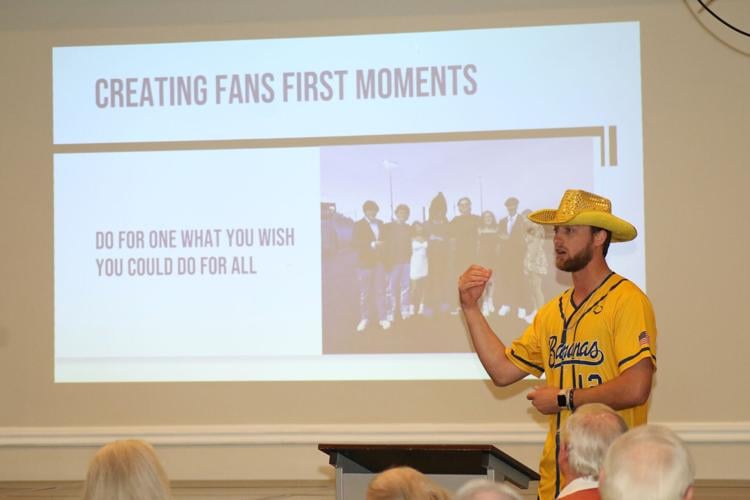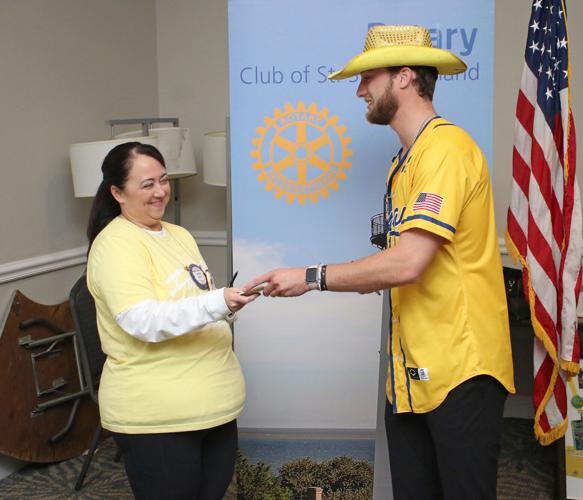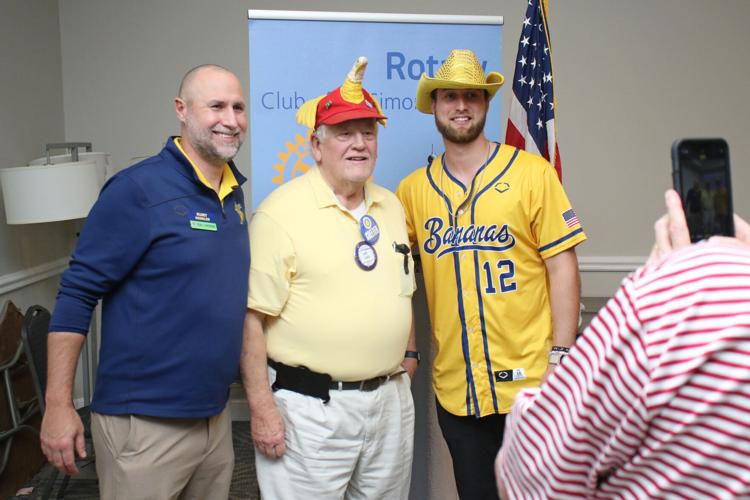GOING BANANAS: Full Banana Ball league could be in future

Savannah Banana pitcher Kyle Luigs speaks to the St. Simons Rotary Club on Tuesday.

Banana Ball has gone nationwide over the past few years, and there is no indication that it will be slowing down anytime soon.
The Savannah Bananas have taken the world by storm since the former wood-bat collegiate summer league team decided to lean fully into a new brand of baseball simply dubbed “Banana Ball.”
The Bananas had been successful on the field, winning three Petitt Cup championships as a member of the Coastal Plain League since the team’s founding in 2016, but now the team is selling out stadiums and having their games aired on ESPN, which also features a miniseries on the team called “Bananaland” via its streaming service.
The explosion in popularity can be attributed to a risky move by the organization to move away from traditional baseball into something more accessible to fans.
On Tuesday, Savannah Bananas pitcher Kyle Lugis and guest experience coordinator Kurt Kessler spoke to the St. Simons Rotary Club about how those changes came to fruition.
Lugis is a former Richmond Hill pitcher who played three years at North Georgia before transferring to play his final year of college ball at Jacksonville State University. During that time, Luigs and his roommate first joined the Bananas on a two-day contract in 2018.
Able to catch on with an organization that was named the CPL organization the two years prior, Luigs expected to see continued strides from the Bananas, but he never could have imagined preparing to depart for a tour that spans 80-plus games in 26 cities.
“Every year you just kind of saw it growing,” Luigs said. “We never saw Banana Ball in the future, or even touring all these cities and states all over the place, and getting to play at major league stadiums now — if you asked me that in 2018, I would be be like, ‘That’s probably not going to happen, or I don’t even know how that would happen.’”
Coming off back-to-back Petitt Cup championships, the Savannah Bananas announced they were folding their collegiate amateur team to commit to playing Banana Ball full-time in the summer of 2022.
After unveiling the altered sport in 2020, Banana Ball has become a must-see event by altering the rules of the game to make for a more fan-friendly show. There are currently 11 rules that turns baseball into Banana Ball:
1. Win the inning, get the point — every inning is worth one point, and the team that gets the most runs in an inning is awarded the point (except the last inning, where every run counts).
2. Two hour time limit — no new inning can be started after two hours.
3. No stepping out — if a hitter steps out of the batter’s box, they’re awarded a strike.
4. No bunting — if a hitter bunts, they are ejected from the game.
5. Batters can steal first — on any pitch of an at-bat, the hitter can try to steal first base.
6. No walks allowed — if a pitcher throws ball four, the hitter will sprint around the bases and every defensive player on the field except the pitcher and catcher must touch the ball before it becomes live.
7. No mound visits allowed — no mound visits from the coach, catcher or any other player at any time.
8. If a fan catches a foul ball, it’s an out — self explanatory, but fans are a part of the action.
9. Showdown tiebreaker — if the game is tied at the end of the two-hour limit, the game is decided in a sudden death format that begins with a pitcher, catcher and one fielder against one hitter.
10. The Banana Ball challenge rule — each team is allowed to challenge one ruling, which is signaled by the coach throwing/shooting a challenge prop/item onto the field before the next pitch. Fans also have one opportunity to issue a challenge through a chosen fan representative.
11.The golden batter rule — One time a game, a team may send any hitter in the lineup to bat in any spot.
The changes are governed by a single challenge, improving the fan experience. But the Bananas aren’t looking to displace the sport, rather offer an alternative.
“I’m 25 going on 26 — I’ve been playing baseball for 21 years; I love baseball,” Luigs said. “I love nothing more than to sit on the couch and watch a 2-1 pitchers duel that takes four-and-a-half hours. I’m not trying to pull away from that. I love that. It’s in my blood. That’s what I grew up on, and that’s what it is. We’re just finding that people in these next generations are having a much shorter attention span. They want stuff now, and they want to see stuff they’ve never seen before. A lot of people are getting that entertainment in 7-10 seconds on their phone, and if it’s not entertaining, they’re going to swipe and go to the next thing. MLB attendance is down because the games are too long.
“So it’s truly what we talked about in putting fans first in all the decisions that you make… It’s just eliminating all these friction points that they have to make the game more entertaining, but also uphold the integrity of the sport that has been around for centuries and centuries. It’s the game we grew up playing, it’s the game everybody loves. We’re in no means trying to disrupt the game of baseball or completely tear away. At the end of the day, they’re going to do their part by inspiring people, and we’re going to do our part by inspiring people, and we’re probably going to get people who don’t even know about baseball coming to our show. They might like dance a lot and find out they like baseball. That’s the best of both worlds.”
One look at the crowd at a Bananas game will tell you they’re doing just that.
The Savannah Bananas will sell one million tickets this year. Tickets are so hard to come by, the organization has adapted a Masters-style lottery system in an effort to be as fair as possible with its distribution.
With demand on the rise, the Bananas have continuously expanded — playing two games at Hank Aaron Stadium in Mobile, Alabama in 2021 to a six-city, 14-game slate in 2022, and onto more than 80 games this past year.
Major League Baseball has been in contact with the Bananas, opening up a dialogue about how to improve its own fan experience. One area the MLB has experimented with is trying to cut down on length of games.
“Baseball has instituted that pitch clock to try to tighten the span of their games because they know fans get worn out,” Kessler said. “They’re doing those things. There is going to be more conversations as we get bigger about how does the MLB adjust to maybe some things we’re doing, but more importantly, how do we appeal to those masses.
“We obviously have such a huge population that just wants to see us, and wants to experience what we’re doing, so how do we make that bigger. There is a good possibility that here in a couple of years we could have multiple teams in multiple cities and have our own Banana Ball league. That very well could happen in the next couple of years.”
The Savannah Bananas aren’t the only team in town anymore. The Bananas routinely face off against the Party Animals during Banana Ball games, and this past October, the Firefighters made their debut as the newest club under the Banana umbrella.
A full Banana Ball league seems like the next logical step — and one the players on on board with.
“That’s something I’m really excited about,” Luigs said. “I think one of the worst things that we can do going forward is to remain stagnant and kind of put on the same show, that might be phenomenal and we can play it in different places, but the worst thing we can have is somebody who wants to see us once a year and that’s it. Where they want to come see us one time and that’s it because if you see it, you’ve seen everything.
“I think the induction of the league is going to be fantastic for us. I think it’s also going to bring back that competitive edge for the players too — something similar to conference play in college. Last year on the tour we played 87 games, and I think we played 81 against the Party Animals. Me bing a pitcher, it gets a little bit stagnant, and they get really good at hitting me because they see me a lot. So it kind of brings that competitive edge back into it and makes it really fun and exciting.”


